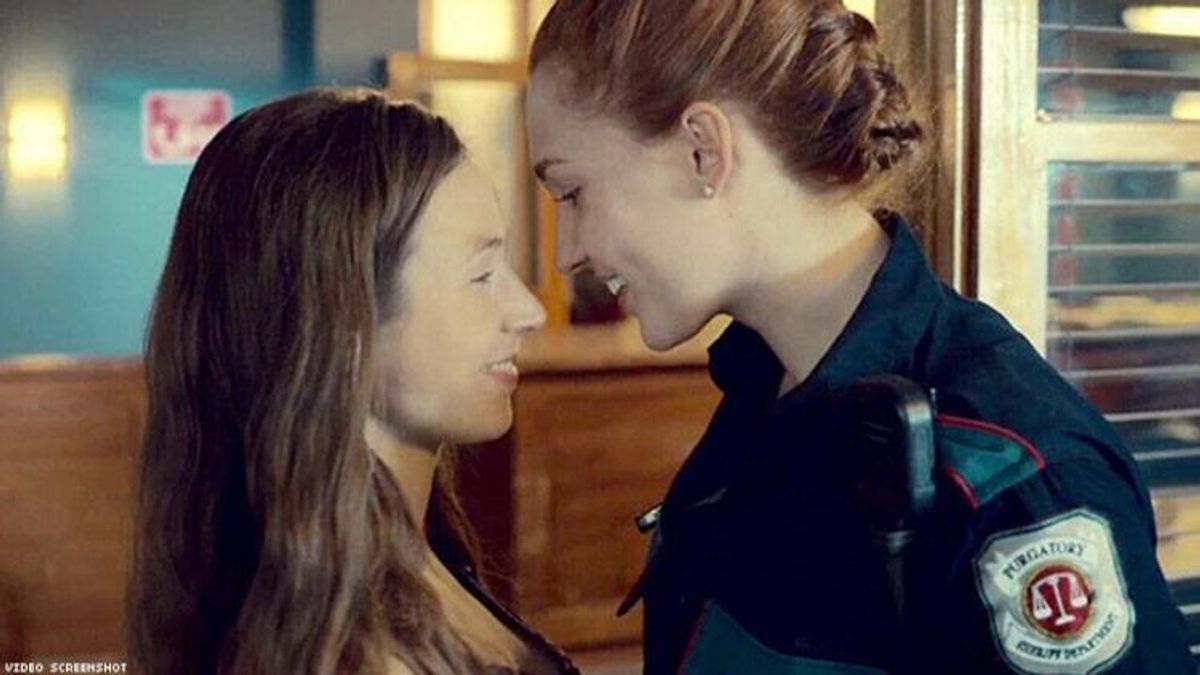Playing a lesbian badass on a science fiction Western sounds like a great gig but definitely not a long-term one. In Westerns, characters die. But when those characters are lesbians, it's hard to imagine them surviving more than one episode. The "bury your gays" trope is alive and well, with queer female characters slaughtered in droves on TV (e.g., The 100, Black Sails, Masters of Sex, Rogue, etc.). But there is at least one actress who doesn't have to worry.
On SYFY's Wynonna Earp, Dominique Provost-Chalkley plays Waverly Earp, the title character's queer sister. "Wynonna came at a time in my life where I was basically learning of the kind of the woman I wanted to be," she told The Advocate. "In playing Waverly, I have learned to be proud of my differences and celebrate them rather than be ashamed of them."
Provost-Chalkley is likely going to be playing Waverly for a long time. Showrunner Emily Andras, who previously spearheaded queer cult classic Lost Girl, has gone on the record vowing to fans that she will not kill off her queer characters. On that promise, she's built a legion of dedicated viewers and a supernatural Western horror series where female voices are living up to their full-bodied potential.
Provost-Chalkley noticed the difference when her character dealt with a coming-out storyline in Wynonna Earp's first season. Andras guided her through "all of the things that Waverly went through, like coming out, and the way it was addressed was so sensitive because it was a female showrunner.
"I'm sure there are huge amounts of amazing male writers out there, but there's something about having this kind of motherly figure, that she just cares so much about the storyline and the characters that you feel comfortable talking to her about those issues."
Talking about those issues has always been easy for Andras. "I have been so lucky to have been from Canada because I feel like we're just a little bit farther ahead as far as diverse storylines and LGBTQ-friendly storylines," she told The Advocate. "I was a showrunner of Lost Girl too, which was many years ago but had a bisexual lead, and everyone was like 'No problem,' but because it was genre, it was easier to do that stuff."
While Lost Girl was a fantasy, Wynonna Earp brings smart, diverse, and LGBTQ-friendly storytelling to the Wild West, a paradox that's not lost on Andras. "I think if you think of a traditional Western, it's like the height of the patriarchy, right? It really, like, comes from a desire of men to go and kind of conquer, right? When you think about the Western, it's a world of men, to be completely honest, kind of like shooting guns and taking over towns and fighting over women."
Why, then, did she decide to make her promise for lesbians to have their chance at a happy ending in that setting? "This genre is particular, is fresh for subverting it and taking all of those traditional male roles and replacing them with women or people of color and LGBTQ characters. It just felt like it was a way to reinvent something that lived in the land of the patriarchy and make it completely, completely fresh. The myth is that the American West is a place you can reinvent yourself, it's a place of individuality, but it seemed to have only been a place where white men got to be the heroes."
The surplus of TV's white male heroes (or even antiheroes) makes Andras roll her eyes. "We've all seen the male white antihero lead a billion times, but more and more there are 500 TV shows on any channel at any given moment now, you have to do something to stand up, maybe it's time to tell a story that hasn't been told before."
To her, effecting change is not just about minorities breaking through the glass ceiling, but replacing who in Hollywood can open the gate so they can take the elevator up. "We need more queer creators, in the same way we need more diverse creators. I feel like now that I'm in a position of power, the truth is we need more queer gatekeepers and more queer people who make the decisions," she explains, noting that agents, executives, and financiers are often the people who give diverse voices power. To her, it will be more of the same "until we replace the top-level executive asking, 'Well, how is this going to play in the Midwest?'"
Now in the position to hire upcoming writers, Andras has other concerns. "Well, I don't really give a shit how it's going to play in the Midwest -- also, if it's a good story it will play well in the Midwest. People are just hungry for something new that we haven't seen before, right?" On Wynonna Earp, she's doing her part to change the Hollywood climate and the way queer women are treated on-screen and off.
"Really, the problem is the people who are making decisions still largely operate on a pretty traditional model. Now that I'm a showrunner, I really try to put my money where my mouth is and encourage other queer creators or writers to kind of take a step forward and make your own shit."
Wynonna Earp season 3 returns this summer on SYFY.














































































